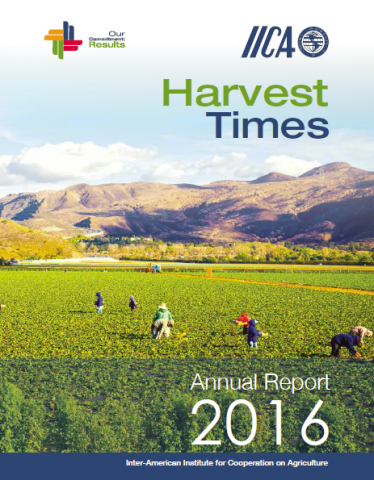Welcome to our second edition of 2017!

As every two months, I am happy to share with you, some of the work that our Institute conducts to help our Country Members in the development of their agricultural and rural sector. This newsletter also invites you to join us and to work together, to achieve a truly productive, sustainable and inclusive agricultural sector and in that way to make this world better for our generation but especially for the generations to come
During the period of time that this newsletter covers, our Institute produced its 2016 Annual Report from which I would like to share the following (taken directly from the report):
“….In 2016, the Inter-American Institute for Cooperation on Agriculture (IICA) consolidated its results-based cooperation model through the implementation of 5 inter-American projects, 12 multinational projects, 12 regional integration mechanisms and 31 rapid response actions. This set of initiatives was complemented with 208 externally funded projects whose execution called for total expenditure of close to USD 110 million…
“…The principal objectives of those projects and actions were as follows: a) strengthen the capacity of public institutions to devise and implement policies and strategies for agriculture and rural life and promote the modernization of research, extension, agricultural health and marketing services; b) boost organizational and individual capabilities for the meshing of chains, resilience, health, inclusion, and market access; and c) promote innovation, with emphasis on technologies associated with production systems, agribusiness, renewable energies, water harvesting, packaging, greenhouse gas management and the improvement of seeds, among others…
“The most significant results achieved through the implementation of IICA’s portfolio of projects were as follows:

“More competitive agricultural chains: more than 3500 people working in various chains (cashew, coffee, cacao, flowers, poultry, vegetables, cattle, sheep, goats, sweet potatoes, bees, bamboo, corn and sugar) in 20 countries are better equipped to access markets, add value to their products, strengthen partnerships, generate new business, and innovate.
“Family farming with greater opportunities: Honduras, Peru, Colombia, Paraguay, and Venezuela received proposed policies for improving the performance of family farming (FF), while Chile, Paraguay and Guatemala expanded the capabilities of their FF extension services.
“Social inclusion in rural territories: nine countries have area-based development plans or coordination entities that promote the economic, social and political integration of vulnerable groups in rural territories such as Esmeraldas (Ecuador), Manpoliza (Guatemala), Cariri (Brazil), and Marowijne (Guyana).
“More resilient agrifood systems: as many as 450 technical officers from 65 institutions were trained to implement plans that integrate climate change management into agricultural programs, while another 60 were trained in risk mapping. At least three platforms for sharing knowledge about climate, insurance, and soil and water are operating for the benefit of IICA member countries.
“Agricultural health and food safety: Timely assessments were carried out of the status of current or potential pests and diseases, such as mollusks (Andean Region), coffee leaf rust (Central America and Jamaica), the carambola fruit fly (Guyana and Suriname), and Huanglongbing (Argentina). IICA also designed strategies for strengthening animal and plant health services, collaborated in efforts to prepare officials to participate in international meetings, and helped the countries gain a better understanding of legal frameworks, including the U.S. ood Safety Modernization Act (FSMA), that permit smoother trade between exporting countries.
“Reduction in food losses: The updating and application of tools for the analysis of agrifood chains, such as the MECA methodology, are a first step towards the development of strategies for reducing postharvest losses and improving the efficiency of chains in the member countries.
“Participation in global and regional events: IICA helps representatives of national institutions prepare to play an effective part in global and regional events on climate change, agricultural health, food safety, and trade, among other subjects, and disseminates timely information prior to such events…
“Knowledge management: The Institute organized more than 700 training events designed to enhance the expertise of 51,750 people and share knowledge about various subjects: Codex Alimentarius, good agricultural practices, climate change adaptation, water management, soil use, renewable energies, food safety, risk management, associative enterprises, financing, and market linkages, among others. Furthermore, some 244 scholarship holders from 18 countries are enrolled in master’s and doctoral programs at Mexican universities thanks to the Capacity Building Program to Promote the Development of Agriculture in the Americas, implemented under an agreement between Mexico’s National Science and Technology Council (CONACYT) and IICA…”
I would like to end the introduction to this newsletter by recognizing that during the month of April, 2017, “Nature” published a supplement devoted to Food Security (Nature, 2017, Food Security, Vol 554 No. 7651_supp pp S5-S52;). In this issue, we are reminded of the important challenge that providing food, eliminating hunger and improving nutrition represents for our generation and for the generations to come. Also important is the contribution that science, technology and innovation will play in achieving the goals of increased productivity and the quality of food. Although the Nature supplement does not discuss the importance that transforming the social network and of reducing inequalities among the different segments of the society will have on food security, I am sure that we need to innovate and work with equal intensity to innovate in those areas and truly reach a new governance of the food systems around the world in order to truly achieve food security and to provide the next generations with at least the same opportunities that our generation has enjoyed.
I hope you will find the information in this newsletter useful and invite you to contact us (miguel.garcia@iica.int) to explore possibilities to work together to advance agriculture in the Americas.
Sincerely,
Dr. Miguel García-Winder, IICA Representative in the USA, Head of CAESPA
*The opinions expressed in this newsletter are those of the authors and they do not reflect the position of the Institute on the topics presented.
*This post appears in the IICA Delegation in the USA Newsletter – March – April 2017










